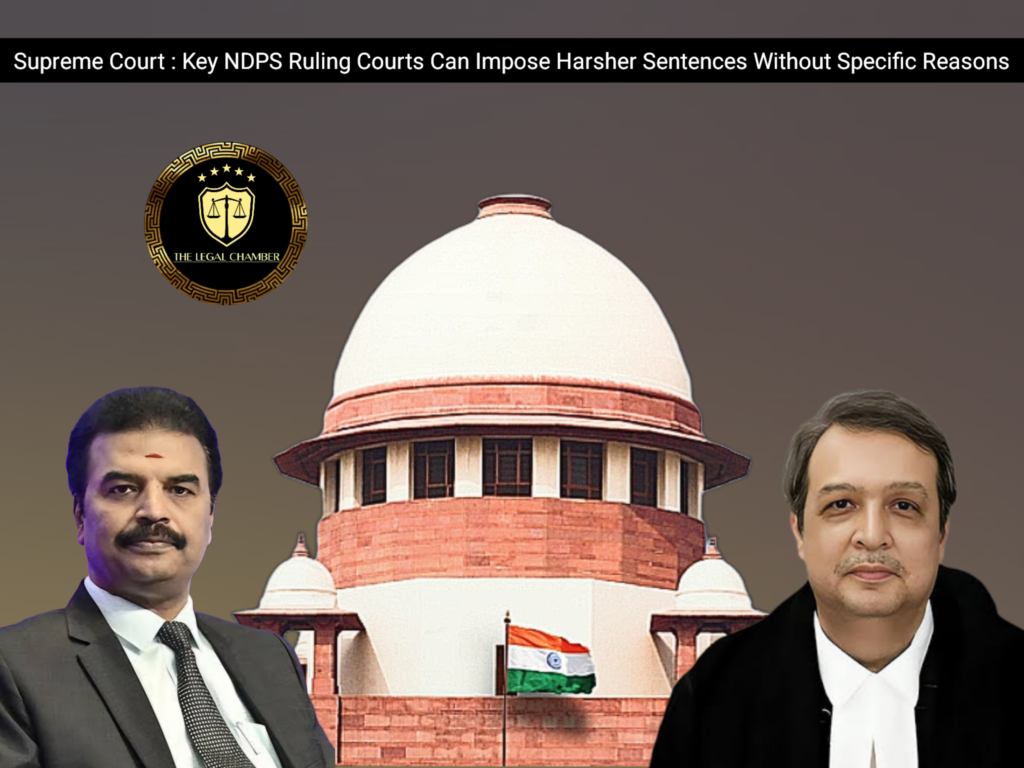
The Supreme Court clarified the interpretation of Section 32-B of the NDPS Act, ruling that courts are not restricted to the factors listed in clauses (a) to (f) for imposing sentences higher than the minimum. The judgment affirmed that judicial discretion allows consideration of additional relevant factors, such as the quantity of contraband, to justify enhanced punishment. It overturned the High Court’s erroneous view that special reasons under Section 32-B were mandatory for exceeding the minimum sentence. The decision reinforces that sentencing flexibility under the NDPS Act remains broad, subject only to reasonableness and relevance of the factors considered.
Facts Of The Case:
In September 2018, the police in Ambikapur, Chhattisgarh, received information that Narayan Das and another individual were standing near Parsa’s main road with a bag containing psychotropic substances. A search led to the seizure of 236 cough syrup vials (containing Codeine Phosphate), including 143 R.C. Kuff, 70 Codectus, and 23 Elderqurex bottles. The petitioner was charged under Section 21(c) of the NDPS Act for possessing commercial quantities of contraband. The Special Judge (NDPS Act) convicted him and sentenced him to 12 years of rigorous imprisonment with a fine of ₹1 lakh.On appeal, the Chhattisgarh High Court upheld the conviction but reduced the sentence to 10 years, the statutory minimum, holding that the trial court had not assigned “special reasons” under Section 32-B of the NDPS Act for imposing a higher sentence. The High Court relied on Rafiq Qureshi (2019), interpreting Section 32-B to mean that sentences beyond the minimum require aggravating factors like violence, public office misuse, or involvement of minors.The Supreme Court, however, disagreed, clarifying that Section 32-B does not restrict courts to only the listed factors. It held that quantity, nature of the substance, and other relevant considerations can justify a higher sentence, even without the specific aggravators under Section 32-B. While it did not restore the 12-year sentence, the SC emphasized the broader judicial discretion in NDPS sentencing.
Procedural History:
The case originated in 2018 when Narayan Das was arrested in Ambikapur, Chhattisgarh, for possessing 236 cough syrup vials containing Codeine Phosphate, a psychotropic substance under the NDPS Act. The Special Judge (NDPS Act), Surguja, convicted him under Section 21(c) and sentenced him to 12 years of rigorous imprisonment with a fine of ₹1 lakh.Das appealed to the Chhattisgarh High Court, which upheld his conviction in 2023 but reduced his sentence to 10 years—the statutory minimum—reasoning that the trial court had failed to cite “special reasons” under Section 32-B for imposing a higher sentence. The High Court relied on Rafiq Qureshi v. NCB (2019), interpreting Section 32-B restrictively.Dissatisfied, Das filed a Special Leave Petition (SLP) in the Supreme Court, which dismissed his appeal in July 2025. While the SC declined to restore the 12-year sentence, it clarified that Section 32-B does not limit sentencing discretion to its enumerated factors, emphasizing that quantity and other relevant considerations can justify harsher penalties. The ruling reinforced judicial flexibility in NDPS sentencing.
READ ALSO :How a Missing Detail in a Will Led to Its Rejection by the Supreme Court
Court Observation:
The Supreme Court made several critical observations while dismissing Narayan Das’s appeal. It emphasized that Section 32-B of the NDPS Act does not restrict courts to only the factors listed in clauses (a) to (f) when imposing sentences higher than the minimum. The Court clarified that judges retain discretion to consider other relevant factors, such as the quantity and nature of the contraband, even if no aggravating circumstances under Section 32-B are present.The Court criticized the High Court’s narrow interpretation of Rafiq Qureshi v. NCB (2019), noting that the ruling never intended to make Section 32-B’s factors mandatory for enhanced sentencing. It reiterated that sentencing must remain flexible and fact-dependent, with higher courts only intervening if the trial court relies on irrelevant considerations. While the Supreme Court upheld the High Court’s reduction of the sentence to 10 years, it reaffirmed the broader judicial discretion available under the NDPS Act, ensuring that future courts do not treat the minimum sentence as a default maximum.Ultimately, the judgment struck a balance—preserving individualized sentencing while preventing arbitrary enhancements, reinforcing the rule of law in narcotics cases.
Final Decision & Judgement:
The Supreme Court dismissed Narayan Das’s Special Leave Petition, thereby upholding his conviction under Section 21(c) of the NDPS Act while letting stand the High Court’s reduced sentence of 10 years’ rigorous imprisonment. Though the Court declined to restore the original 12-year sentence, it delivered a landmark clarification on sentencing principles under the NDPS Act. The bench emphatically rejected the notion that Section 32-B’s enumerated factors are exhaustive or mandatory for imposing sentences beyond the minimum, holding that courts retain broad discretion to consider other relevant circumstances, particularly the quantity and nature of seized contraband. This decision overturned the High Court’s restrictive reading of Rafiq Qureshi, reaffirming that trial judges may impose enhanced sentences based on any cogent factors they deem appropriate, subject only to appellate review for reasonableness. The judgment strengthens judicial flexibility in drug-related cases while maintaining necessary safeguards against arbitrary sentencing, ultimately preserving the NDPS Act’s deterrent intent without compromising on individualized justice. All pending applications were disposed of accordingly.
Case Details:
Case Title:Narayan Das vs. State of Chhattisgarh Citation:2025 INSC 872 Appeal Number:Special Leave Petition (Crl.) No. [Diary No. 30825/2025] Date of Judgment:17th July 2025 Bench: Justice J.B. Pardiwala & Justice R. Mahadevan
Download The Judgement Here